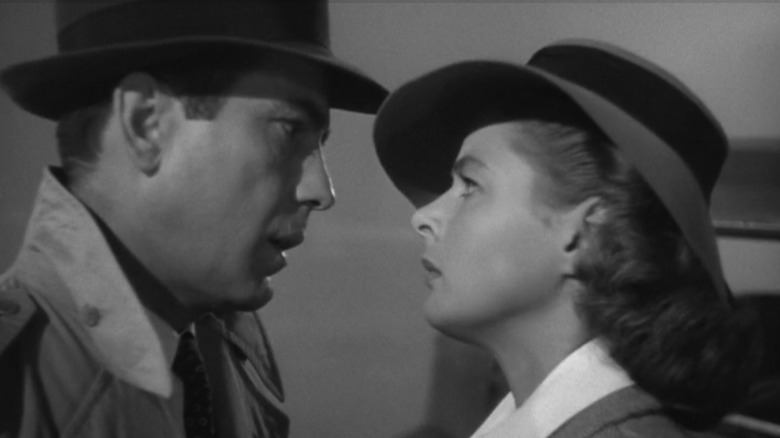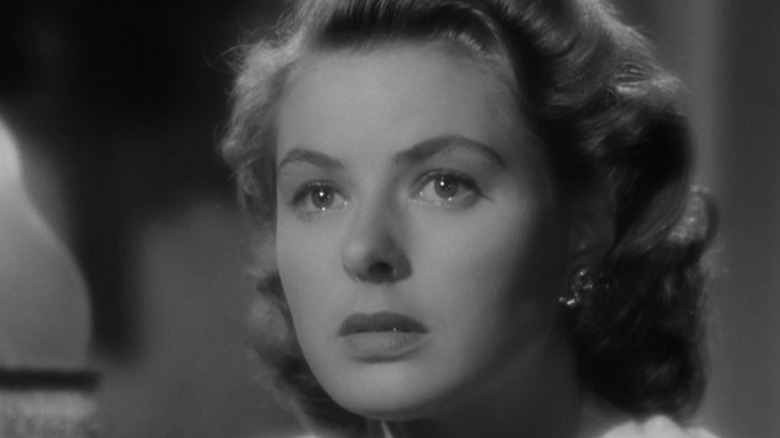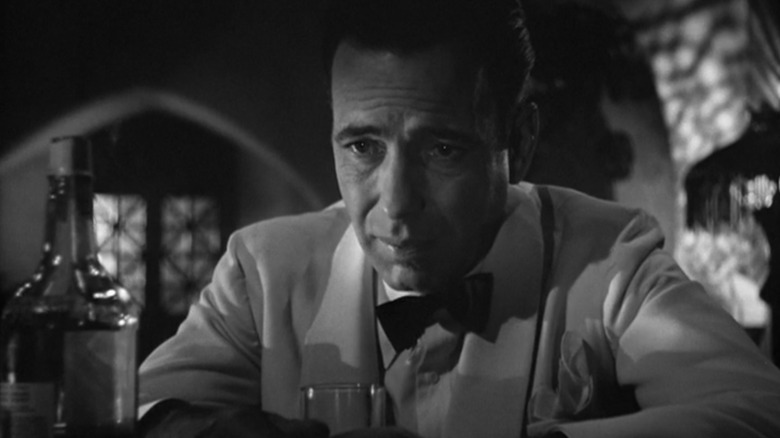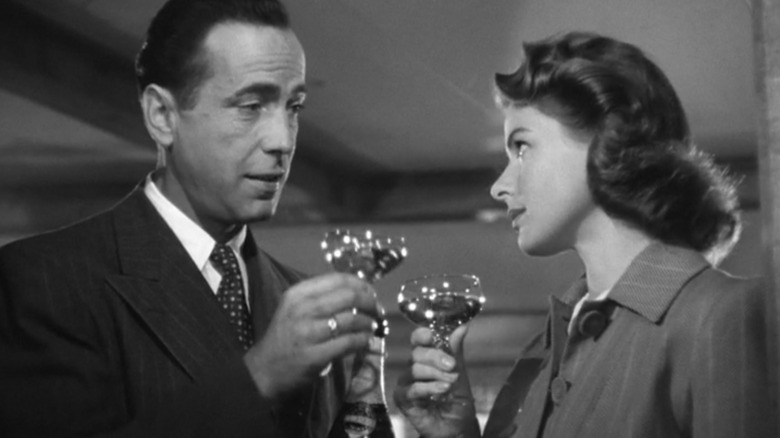Why Humphrey Bogart And Ingrid Bergman Never Thought Casablanca Would Be A Hit
Very rarely does a filmmaker know they are making a masterpiece as they are making it. Chances are pretty good that if someone is setting out to create a masterpiece, it will inevitably be so self-conscious about its own desire for importance that it becomes insufferable to experience. Generally, the hope of an artist is that whatever they are making is, at a baseline, good. If people respond to it ecstatically, that's just gravy. If it stands as one of a medium's crown jewels 80 years after its release, that's rarified air in which only a few select works can exist. Unquestionably, one of those works is the World War II romantic melodrama "Casablanca."
In many ways, "Casablanca" has become the poster child for Hollywood's Golden Age. The movie star glamor, the sweeping romance, and the litany of quotable lines are now fixtures of the language of cinema and its history. When you have Humphrey Bogart delivering lines like, "Here's looking at you, kid," or, "Of all the gin joints, in all the towns, in all the world, she walks into mine," everyone involved must have thought they were making something great. Good, at the very least. This could not further from the truth.
"Casablanca" was being written on the fly during production, and its two lead actors, the now iconic pair of Humphrey Bogart and Ingrid Bergman, did not really have any idea what they were doing on set. As film historian and author of "We'll Always Have Casablanca: The Life, Legend, and Afterlife of Hollywood's Most Beloved Movie," Noah Isenberg, said to The Washington Post, "It was a miracle."
It won't amount to a hill of beans
One of the keys to delivering a great performance for a character is understanding their motivation and intention. Basically, every scene in any movie concerns a character wanting something in the scene and making various attempts to get it, all in service of the ultimate want of the entire film. With "Casablanca" being a romance, the characters knowing who they should fall in love with is a pretty important piece of information to internalize in order to modulate their performances accordingly. Ingrid Bergman as Ilsa, the woman caught in a love triangle between Bogart's café owner Rick and resistance leader Victor Laszlo (Paul Henreid), was not privy to this knowledge until extremely late into the production. Dave Kindy writes, "Indeed, it was a wonder, especially given how the production had started. With the script still being written, Bergman fretted about how to portray Ilsa. Did she love Rick or Laszlo? Bergman said she didn't know."
Bergman being unaware of Ilsa's true affections in the moment makes her performance, which she was outrageously snubbed of an Oscar nomination for, all the more stunning. It allows her to only play what is present on the page for that particular scene, shifting her allegiances from scene to scene depending on what was being called on her to do that day. That doubt actually turns out to be a strength of the film, as the ending of Rick sending her and Victor away on the plane feels much more complicated and nuanced than it would had she clearly chosen a side throughout the picture.
Ultimately, the Hays Production Code determined who she would end up with. Ilsa was married to Victor, and as Isenberg said, "Ilsa cannot stay with Rick because that would be tantamount to condoning adultery," a blatant violation of the Code. Love triangles like "Casablanca" or "The Philadelphia Story" required a certain ending to affirm marriage and fidelity, and short of Victor getting killed at some point during the movie, which was indeed a story beat on the table during production, Ilsa would have to be with him. Ultimately, they chose not to kill him, and the twist of Rick finally sticking his neck out for someone becomes a classic movie ending and the perfect resolution to their relationship.
Bogart goes beyond brute
The prestige picture was not the purview of Warner Bros. at the time. They were at the forefront of crime movies and gangster pictures, making stars out of Edward G. Robinson and James Cagney. One of the studio's go-to tough guys to play heavies and gangsters was Humphrey Bogart in films like "The Petrified Forest," "Bullets or Ballots," and "The Amazing Dr. Clitterhouse." Bogart had only recently started becoming a major star, with leading turns in "High Sierra" and the film noir classic "The Maltese Falcon," but they were still parts in the same milieu he had been operating. Playing a romantic leading man in a movie was a foreign concept to Bogart. Turner Classic Movies host Ben Mankiewicz said, "Bogart was not into that character." He had been typecast so long as one thing that not only was it hard for him to accept that he would be a viable person capable of romance, but would the public at large?
Of course, they did. Bogart could channel that brutishness found in all those crime movies and turn it in on himself. The steely demeanor and standoffish attitude was no longer who the man was, but it became a defense against letting someone hurt him so deeply ever again. After "Casablanca," Bogart being a romantic lead was commonplace, from his Oscar-winning performance in "The African Queen" to the litany of films he did with his real life wife Lauren Bacall. Nearly all of them involve breaking down that outwardly gruff exterior to get to his heart, and that consistently proved to be a winning formula. However, none of them ring has true as "Casablanca."
The beginning of a beautiful legacy
Timing, naturally, aided in "Casablanca" becoming the phenomenon it did. Studio reader Stephen Karnot read the initial screenplay for the film the day after the Japanese attacked Pearl Harbor in 1941. Less than a year later, "Casablanca" premieres just as the United States has entered World War II. This kind of heightened romance and emotion among a contemporary war was the perfect circumstance for "Casablanca" to become an enormously important cultural touchstone, with it ultimately winning Best Picture and Michael Curtiz taking home Best Director.
After 80 years, this rocky production, filled with so much doubt and angst, feels utterly effortless. Everyone involved was the same level of unsure about what they were making, and that doubt led to chances being taken and emotions being raw, resulting in one of the finest products Hollywood has ever produced. Co-writer Jules Epstein may have said that the film had "a great deal of corn, more corn than in the states of Kansas and Iowa combined," but that earnestness can only derive from an emotionally poignant and honest place. Making "Casablanca" may not have been a fun, easygoing time, but it has entertained and moved generations of audiences and will continue to do so long after all of us are gone.



